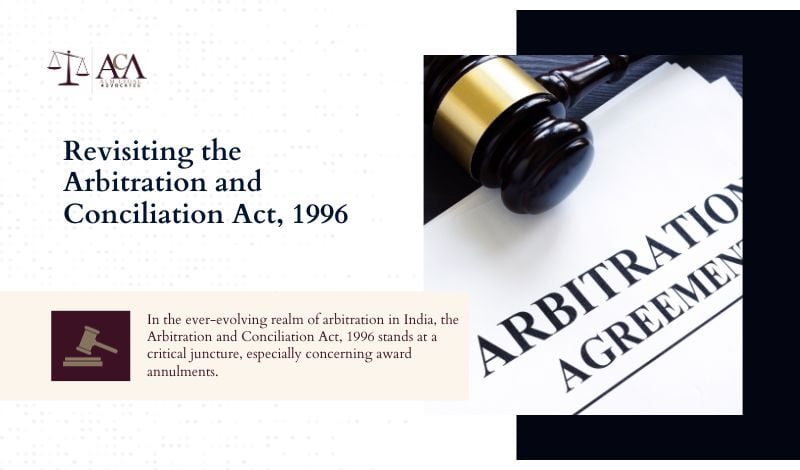Table of Contents
ToggleThe Arbitration and Conciliation Act, 1996
The Arbitration and Conciliation Act, 1996 has been a topic of extensive debate and judicial interpretations. Despite numerous discussions around it, there’s an evident lack of clarity on the aftermath of an award’s annulment. The Act provides only a vague notion of the consequences thus presenting a somewhat bleak scenario.
Originating from the UNCITRAL Model Law on International Commercial Arbitration, the Act permits domestic awards (those passed in India-based arbitrations) to be annulled either partially or fully under Section 34. Following such a decision, parties grapple with several uncertainties including the future of the arbitration agreement, the need to restart arbitration processes, potential applicability of res judicata or estoppel in fresh arbitration among others. These concerns are not directly addressed in Section 34 proceedings due to the Court’s specific jurisdiction.
A notable ambiguity lies in the process of restarting arbitration after an award’s annulment. In view of this, the Indian judiciary has consistently provided interpretations to address this void. Section 34(4) of the Act in alignment with the Model Law allows courts the discretion to remit an award back to the arbitrator to rectify any existing grounds that render it susceptible to challenges[1]. The Supreme Court in its ruling in Kinnari Mullick v. Ghanshyam Das Damani emphasized that such relegation is permissible only upon a written request and cannot be initiated by the court on its own accord[2].
In addition to the above, a judgement in McDermott International Inc. v. Burn Standard Co. Ltd. asserted that courts, under Section 34 cannot modify the arbitrator’s decisions but can only annul them[3]. This leaves parties with the option to restart the arbitration process if they so wish.
An important perspective emerges from Dakshin Haryana Bijli Vitran Nigam Limited v. M/s. Navigant Technologies Pvt. Ltd., where the Supreme Court highlighted that upon setting aside an award and suggesting that the underlying disputes must be addressed in a new suitable proceeding[4]. This implies that parties can restart the arbitration process, especially if the annulment reasons don’t invalidate the arbitration agreement. This interpretation has received the endorsement of various high courts including the Bombay and Delhi High Courts[5][6][7].
However, the Act remains ambiguous about whether arbitration should continue with the same arbitrator or commence anew. Another complexity arises when an award is partially annulled. Section 34(2)(iv) of the Act allows for partial setting aside of awards but this is contingent on the invalid portion not being intertwined with the valid segment[8].
The Act's Implications and Judicial Precedents
The importance of efficient arbitration is emphasized by cases such as Ssangyong Engineering & Construction Co. Ltd. v. NHAI, where the Supreme Court underscored the objective of swift dispute resolution[10]. In another significant ruling, State Trading Corporation of India Ltd. v. Toepfer International Asia PTE Ltd., the Delhi High Court explained the distinction between annulment and appeal, emphasizing that annulment returns parties to their original positions[11].
The crux is that the rapid resolution of disputes, the primary allure of arbitration in India, only remains advantageous if the arbitral award withstands challenges. If the award is annulled, parties might find themselves at a strategic disadvantage in subsequent arbitrations, given prior knowledge of each other’s strategies and arguments.
International Perspective
The global scenario on arbitration provides a broader context. Notably, major jurisdictions like Singapore, England, and Canada do not provide explicit guidelines on the steps to be taken post the annulment of an award[14][15][16][17]. This leaves a gap in the arbitration process and often puts parties in a quandary on the next steps. In contrast, Germany offers clarity. The German Arbitration Act is explicit in its provision that once an award is set aside, the arbitration agreement between the parties is revived, ensuring that the parties can re-initiate the arbitration process if they wish.
Conclusion
The intricacies following the annulment of an arbitration award necessitate legislative attention. A codified process for restarting arbitration post-annulment will reinforce India’s commitment to fostering a pro-arbitration ecosystem and streamline the resolution of lingering disputes.
Section 34 (4) of the Act.
Civil Appeal No. 5172 of 2017 in SLP (Civil) No. 2370 of 2015.
(2006) 11 SCC 181.
Order dated March 2, 2021 in Civil Appeal No. 791 of 2021 (Arising out of SLP (C) No. 10372/2020).
Juggilal Kamlapat v. General Fibre Dealers Ltd., AIR1962SC 1123.
2010 (5) Mh.L.J. 739.
(2015) SCC Online Del 13394.
R.S. Jiwani and Ors. v. Ircon International Ltd., A Government of India and Ors., 2010(112)BOMLR491.
(2019) 15 SCC 131.
2014 (3) ArbLR 105 (Delhi).
Para 25 – 56, Comparative International Commercial Arbitration.
The International Arbitration Act.
The Arbitration Act, 1996.
International Arbitration Act, Singapore.
The Arbitration Act, 1996, England.
Commercial Arbitration Act, Canada.
Section 1059 (5), German Arbitration Act.






